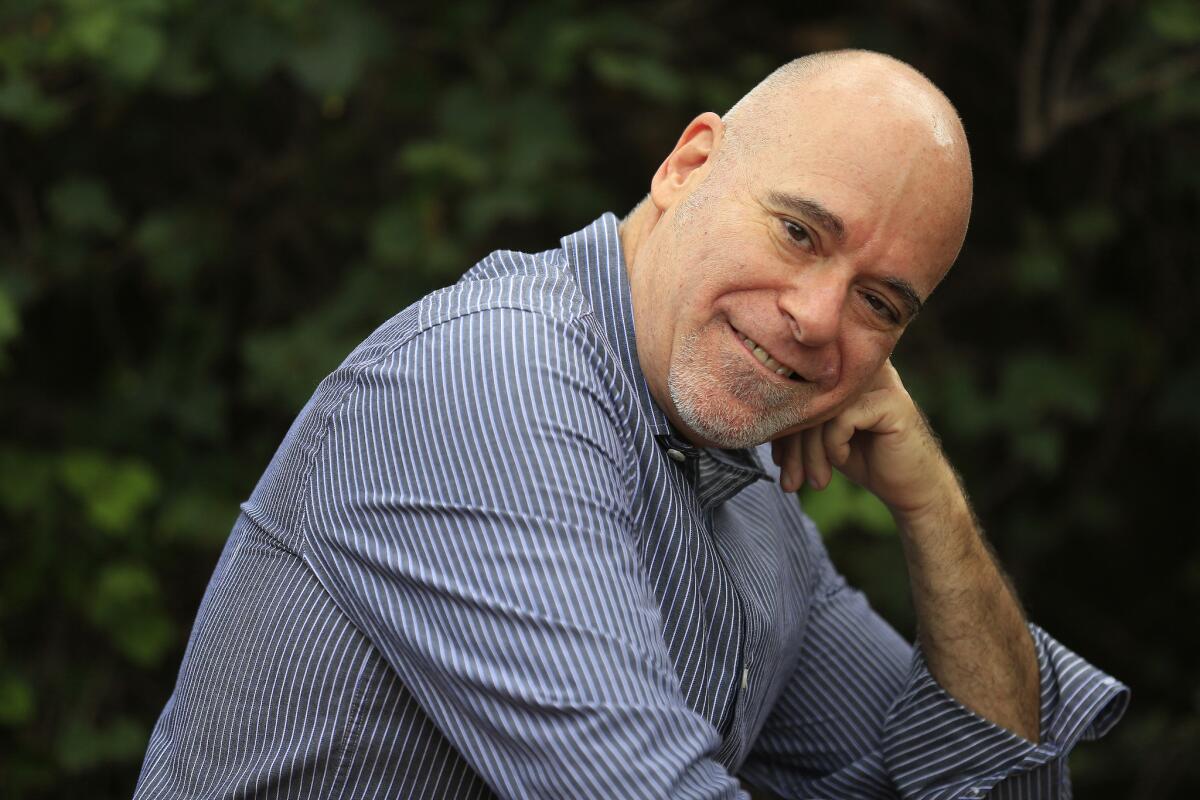Review: ‘My Avant-Garde Education’: Bernard Cooper’s sketches of a life in art

- Share via
Bernard Cooper discovered his passion for art in — of all places — the pages of Life magazine. He was sitting in the library of his Los Angeles middle school in the mid-1960s, studiously putting off research on a geography assignment by leafing through a copy of Life, when he stumbled on an article about Pop art titled “You Bought It, Now Live With It.” The story showed images of Andy Warhol’s unemotional Brillo boxes, a trio of ghostly white figures by sculptor George Segal and a Tom Wesselmann still life painting of a TV — that contained a real television at its heart.
The discovery, he writes, was thrilling: “As I turned the pages and stared at the photographs, it was difficult to tell the difference between a kitchen and painting of a kitchen, or a man opening a door and a sculpture of a man opening a door. Reality was up for grabs, and my sudden unknowing made me giddy.”
The young Cooper quietly tore the article out of the magazine, smuggled the pages out of the library in his shirt pocket, and stored them in his bedside table, where he could pore over them pruriently every night. The effect of Pop art, he recalls, was “nearly pornographic.”
Cooper’s new memoir, “My Avant-Garde Education,” is the story of how he came to love art, to study art, to attempt the life of an artist and to ultimately abandon it after being faced with one too many blank canvases. Thankfully for us, this personal journey led Cooper to another art: the one of putting together words in a combination of funny scenes, astute observations and moments of quiet poetry.
“Longing not only persisted despite my attempts to suppress it, but grew more compelling the more it was confined — a flourishing mutant, as compact and minutely pruned as a bonsai,” he writes of coming to terms with his homosexuality. The book is filled with moments such as these — ones that practically require the reader to stop and savor the sentence again.
In this regard, Cooper is by now well known. The former art critic for Los Angeles Magazine has written five books, among them the critically acclaimed “Maps to Anywhere,” published in 1990, along with two well-received memoirs: “Truth Serum,” a collection of essays about being gay before and after the arrival of the AIDS epidemic, and 2006’s “The Bill From My Father,” which tracked his troubled relationship with his miserly father — who once sent the young writer a bill for $2 million to cover the expenses of raising him.
Like some of his other books, which inhabit a certain literary in-between, “My Avant-Garde Education” is not a standard autobiography. It is not an exhaustive chronology full of names and dates covering the author’s every last personal and aesthetic discovery.
Instead, the book reads more like a series of sketches that gauzily illustrate key moments: There’s the discovery of the Life magazine article. And the class with legendary performance artist Vito Acconci, in which he realizes that art can raise as many questions as it answers. And there’s the poignant final work he made as a student at the California Institute of the Arts — a piece titled “Speech Regulator” that channeled all he hadn’t been able to say about himself in his struggle to obscure his sexuality.
For aficionados of art and art history, particularly that of Southern California, Cooper offers a distinctly personalized view of the era’s most important happenings. As a young man, he frequented the galleries on La Cienega Boulevard, laying eyes on early works by Finish Fetish master John McCracken. He attended CalArts as the school was in the process of being built — sitting in experimental performance sessions with now-venerated conceptualists such as John Baldessari and Allan Kaprow. And in the mid-1960s, he visited Ed Kienholz’s installation of “Back Seat Dodge” at the L.A. County Museum of Art — a sculpture that had generated headlines (and the wrath of a local congressman) for showing a couple groping awkwardly in a back seat.
“I was riveted by the aura of menace,” he writes of the sculpture, “though too uneasy to look for long.”
The book closes with the author’s quiet return to art-making later in life. In despair after losing his longtime partner Brian Miller to AIDS (the section that describes this is wrenching to read), Cooper finds himself collaging images of water and boats — and puts them together in a piece that evokes listing, sinking, drowning.
“I didn’t know then that I’d continue making art for years to come,” he writes. “I was picking up where I’d left off in college, but without waving the banner of avant-gardism as fervently as I had back in the 1970s.”
Cooper had left the world of art-making to others. But art was with him all along.
My Avant-Garde Education
A Memoir
Bernard Cooper
W.W. Norton, 256 pp., $26.95
More to Read
Sign up for our Book Club newsletter
Get the latest news, events and more from the Los Angeles Times Book Club, and help us get L.A. reading and talking.
You may occasionally receive promotional content from the Los Angeles Times.











